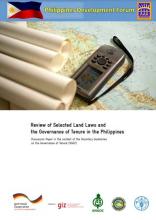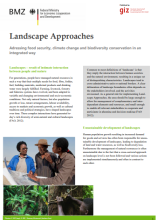Land Library
Welcome to the Land Portal Library. Explore our vast collection of open-access resources (over 74,000) including reports, journal articles, research papers, peer-reviewed publications, legal documents, videos and much more.
/ library resources
Showing items 1 through 9 of 9.A profile of the Lao People's Democratic Republic by the Food and Agriculture Organization of the United Nations.
According to the Climate Risk Index, less developed countries are generally more affected than industrialised countries. The countries affected most in 2013 were the Philippines, Cambodia and India. For the period from 1994 to 2013 Honduras, Myanmar and Haiti rank highest.
This paper describes the current challenges Myanmar faces to shift to a system more inclusive of multiple interest groups. The authors provide background on the situation in Myanmar and its past levels of performance.
This report provides an outline of protected areas and biodiversity in the Lower Mekong Basin.
This report summarises provisional results of Myanmar’s 2014 population and housing census. (Main census results released in May 2015.) The provisional results provide the total population by sex and administrative unit, from national, state/region, district down to township level.
This report draws on the Land Matrix database to analyze and better understand the phenomenon of large-scale agricultural land deals. It focuses on:
» land acquisitions or investments (“deals”) targeting the Global South and Eastern Europe, including only low and middle income countries;
This discussion paper on the “VGGT and National Policies on the Governance of Tenure”3
has
been commissioned by the Asian NGO Coalition (ANGOC) as a member of the Philippine
Development Forum – Working Group on Sustainable Rural Development (PDF-SRD).4 This
For generations, people have managed natural resources in such a way that their multiple needs for food, fibre, fodder, fuel, building materials, medicinal products and drinking water were largely fulfilled.
It is well recognized that secure land and property rights for all are essential to reducing poverty because they underpin economic development and social inclusion.




